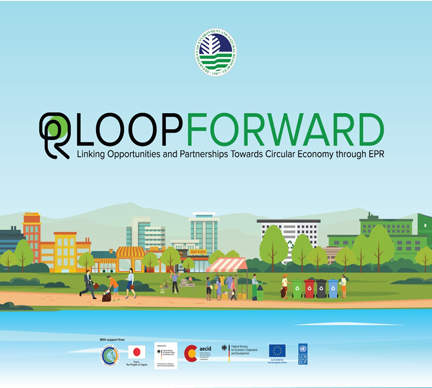 The Department of Environment and Natural Resources (DENR) teamed-up with the United Nations Development Programme (UNDP) for a nationwide campaign that will drive the recovery of waste materials and prevent leakage of waste into the environment. The campaign is in line with the implementation of Republic Act (RA) 11898, otherwise known as the EPR Act of 2022.
The Department of Environment and Natural Resources (DENR) teamed-up with the United Nations Development Programme (UNDP) for a nationwide campaign that will drive the recovery of waste materials and prevent leakage of waste into the environment. The campaign is in line with the implementation of Republic Act (RA) 11898, otherwise known as the EPR Act of 2022.
Dubbed as “LOOPFORWARD: Linking Opportunities and Partnerships Towards Circular Economy through EPR,” the campaign aims for full compliance and effective implementation of the EPR Act of 2022 by industries and other entities through attainment of time-bound waste recovery targets. It highlights the relevance of the EPR concept and law, gain better understanding among its stakeholders, and convene and gain commitments from the country’s biggest private firms referred to as the “obliged enterprises” under the law. It also seeks to gather support and open possible areas for collaboration among national government agencies, local government units, and development partners.
The EPR Act, which lapsed into law in July 2022, amended RA 9003 or the Ecological Solid Waste Management Act of 2000. It places full responsibility throughout the entire life cycle of waste on its producers and requires large companies to adopt and implement policies for the proper management of plastic packaging wastes. The law’s Implementing Rules and Regulations were approved in January 2023.
The EPR approach is practiced in many countries around the world. It focuses on waste reduction, recovery, and recycling, and the development of environment-friendly products that advocate the internationally-accepted principles of sustainable consumption and production, and the circular economy.
Every step of the life cycle of plastic contributes to greenhouse gas emissions—from extraction, transportation of fossil fuels through the energy and emissions, intensive refining, to its disposal as waste then leakage in the environment. The country’s Nationally Determined Contributions, which represents climate action targets to mitigate greenhouse gas emissions and adapt to climate change impacts, are anticipated to be achieved with the aid of this environmental policy.
During the LOOPFORWARD launch, Senator Cynthia Villar, who pushed for the passage of the EPR Act, will deliver her message of support while Secretary Loyzaga will be the keynote speaker. Meanwhile, Climate Change Commission Secretary Robert Borje and UNDP Philippines Resident Representative Selva Ramachandran will welcome the participants and give their respective remarks.
Among the highlights of the program are the talks on the social dimension of single-use plastic in the informal sector by Dr. Emma Porio of the Ateneo de Manila University, and another on climate financing by UNDP Climate Action Programme Team Leader Floradema Eleazar; as well as panel discussions on enabling EPR implementation by key officials from the Department of Finance, the Department of the Interior and Local Government, the Department of Science and Technology, the Department of Social Welfare and Development, the Department of Trade and Industry, with representatives from Holcim Philippines Inc., San Miguel Foods, Plastic Credit Exchange, Nestle Philippines Inc., Universal Robina Corporation, Philippine Alliance for Recycling and Materials Sustainability, and CEMEX Holdings Philippines.
There will also be a ceremonial signing of commitment on EPR.
Throughout the event, the DENR will facilitate onsite registration and submission from private companies of their respective EPR programs either as an Obliged Enterprise, Collective or Producer Responsibility Organization. Organizations with queries about EPR will be also be accommodated through the DENR’s in-house EPR clinic for one-on-one consultations. An exhibit on exemplary EPR programs from select enterprises and organizations will also be featured to help the attendees draw ideas for their own initiatives.
The DENR is the lead implementer of the EPR law and the LOOPFORWARD campaign. The campaign is supported by the CCC and the governments of Germany, Spain, and the European Union under the NDC Support Project for the Philippines, as well as the Government of Japan through the Accelerating NDC through Circular Economy in the Cities Project. ###












